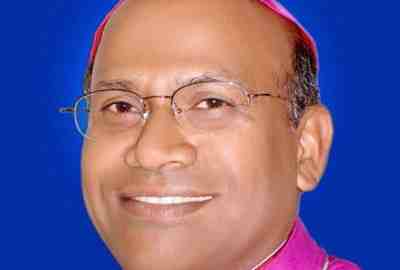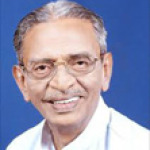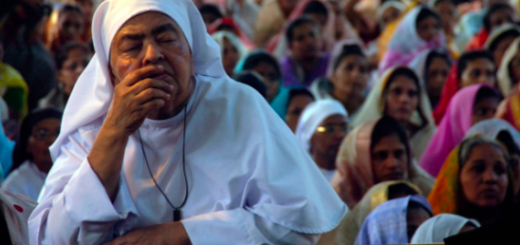Bishop Kidnaped by priests

Indian Currents on corruption in RC Church – An Alert from Cuddapah
 Dr Suresh Mathew (Editor, Indian Currents, Delhi, 09-15 May 2016)
Dr Suresh Mathew (Editor, Indian Currents, Delhi, 09-15 May 2016)
Bishop Prasad Gallela of Cuddapah Diocese, kidnapped, torchured by 3 priests for money
(Note: The truth is that there is no one Catholic Church in India. There are only a conglomeration of three different Rites fighting among themselves privately for religious colonization, territorial expansion, socio-economic domination and prominent positions through possession of superspeciality institutions in posh cities which have top market value in rupee or dollar. They are just a carbon copy of the stinkingly corrupt political system. And each of these Rites are torn apart by the killer disease called the centuries old Caste system – the Bhramins occupying the top executive posts and the laity, like Sudras at the very bottom doing menial jobs for the highly placed. It is to counter this diabolical attitude, tooth and nail, we took on the name: CHURCH CITIZENS, proclaiming equality of all, Pope or Prostitute.
 ”We produce 70% of the clergy in this country but we control only about 0.04% of the territory. We are justified in wanting more territory” is the is the reported long standing pliant of SMC. They and Syromalankara are sweating it out to expand their kingdoms to all posh cities of India first and then to foreign cities like Chicago, Melborne, Europe and middle east. They forget the characteristic trait of the followers Jesus is to be a “Little Flock” (Pusillus Grex) but one that does not bend its knees to any insolent might. For full editorial read: Andhra Bishop abducted, tortured by Priests, Corruption unparalleled in Indian RC Church, in CCV. james kottoor, editor)
”We produce 70% of the clergy in this country but we control only about 0.04% of the territory. We are justified in wanting more territory” is the is the reported long standing pliant of SMC. They and Syromalankara are sweating it out to expand their kingdoms to all posh cities of India first and then to foreign cities like Chicago, Melborne, Europe and middle east. They forget the characteristic trait of the followers Jesus is to be a “Little Flock” (Pusillus Grex) but one that does not bend its knees to any insolent might. For full editorial read: Andhra Bishop abducted, tortured by Priests, Corruption unparalleled in Indian RC Church, in CCV. james kottoor, editor)
Indian Currents cover story
The abduction and torture of Bishop Prasad Gallela of Cuddapah diocese, allegedly masterminded by priests, is yet another reminder to the Catholic Church in India to set its house in order. It is the result of ignoring earlier signals emanated from Tamil Nadu and other places where separate cemeteries and seating arrangements for Dalit Christians are in vogue. Another warning came from Bangalore where the Rector of a seminary was done to death apparently at the altar of regionalism involving Kannada and nonKannada priests. There have been numerous other caste-related ugly scenes in parishes, dioceses and religious provinces across the country. Parochialism, groupism, and greed for money and power also take their toll at various levels involving religious, priests and prelates.
Though Dalits constitute almost 70 per cent of the Christians in India, their presence is eclipsed by ‘upper castes’ who believe in asserting their power. Among the Catholics, this discrimination is strongly felt to the extent that even Dalit bishops are looked down by upper caste priests. Cuddapah incident took the issue to a new level of criminality. The alleged angle of financial corruption added a dubious dimension making it a cocktail of unchristian activities. Those who proclaim to be brothers and sisters in Jesus Christ have proved to be masters in masquerading. Their preachings from pulpits are nothing but procrastination.
It is time that the Church hierarchy wake up from its slumber and take the bull by its horn. Unfortunately, the Catholic Bishops’ Conference of India has not taken up the matter with the seriousness it deserves. Even in the recent plenary session held in Bangalore, the issue does not find a categorical mention as a challenge within the Church. Rather it is camouflaged in innocuous words. Such sweet-coating of serious issues that eat into the vitals of the Church and its various wings will lead to irretrievable situation. Acceptance of the issue is the first step towards solving it.
It is quite clear that the Christian community — Catholic and Protestant, Evangelical and Pentecostal – needs some cleansing, and much healing. It is not enough to claim to be healers. It is equally important to look inward and do some introspection. One might see enough reason to heal oneself. ‘Physician, heal thyself’ is an apt expression here. It is important that we attend to our own faults in preference to pointing out the faults of others. But all is not lost as a senior Church lay leader put out on the net recently. The faith, and the community, survives because for every bad egg, there are many good ones. For every corrupt priest, there are many who serve deep in the forests and at places none would want to go for a pittance as survival allowance. For every parish priest who is a tyrant, there are many more clergy who are beaten up in villages for evangelisation. And while some priests are in jail for abducting a priest or a prelate, some priests are captive of the ISIS.
The Enemy Within – Benwen Lopez, in Indian Currents, 15 May 2016
Victim of Violence: Bishop Prasad Gallela of Cuddapah Diocese
Bishop Prasad Gallela of Cuddapah diocese, Andhra Pradesh,is known for his love for the poor and empowerment of women. He started various grass root level programmes for the poor.
Abduction of a Catholic bishop brings to light corruption, casteism, groupism and craze for power that plague the Church in India. Various dioceses and provinces of congregations are hit by politics played by pressure groups. Healthy debates, rather than muscle and money power, are the right way to resolve differences
Pope Francis issued a mission statement for his papacy that outlined his hope that the Catholic Church would become more merciful to the needy and less confined and clinging to its own security. “I prefer a church which is bruised, hurting and dirty because it has been out on the streets, rather than a church which is unhealthy from being confined and from clinging to its own security,” he wrote. “I do not want a church concerned with being at the center and then ends up by being caught up in a web of obsessions and procedures.”
The Church in India although has many gifts and treasures yet it is plagued by different wounds. And her most painful Victim of Violence: Bishop Prasad Gallela of Cuddapah Diocese. Bishop Prasad Gallela of Cuddapah diocese, Andhra Pradesh, is known for his love for the poor and empowerment of women. He started various grass root level programmes for the poor. And her most painful wounds are casteism and financial corruption.
Indian society is marred by casteism for centuries; it has slowly and steadily plagued the Church, where Catholic brethren face severe discrimination because of their caste. Bishop Prasad Gallela started various grass root level programmes for the poor. He runs several childand-mother care programmes that focus on nutrition and general health.
On the morning of April 25, the prelate was going for a religious function when his car was stopped. He and his driver were kidnapped and taken to a location, where the Bishop was stripped of his cassock; his hands were bound with the red fascia (sash); and he was beaten up with iron rods and sticks. The prelate, along with his driver, was released at 2 a.m. after hours of torture. Sources close to the prelate also verbally abused for his caste.
Three priests – Fr. Raja Reddy, Fr. Vijaymohan Reddy and Fr. Sanivarapu Reddy –along with 11 others have been arrested in the case on charges of kidnapping for ransom and making an attempt on the life of the bishop. Sources close to the investigation have confirmed that there are two primary motives behind the attack – caste issue and financial corruption. Bishop Gallela hails from a Dalit community and has been looked down by priests belonging to higher castes. Another reason is reported to be that the accused priests had demanded transfer of the current diocesan procurator and the post be given to Fr. Sanivarapu Reddy, but the prelate had declined the request. The diocesan procurator is the official in-charge of all collections in the diocese. Fr. Reddy had also demanded some funds for his parish but the process was delayed. The three priests had threatened the prelate on earlier occasions also with dire consequences for not adhering to their requests.
They released him on condition that he would transfer Rs. 50 lakh to them. Diocesan sources confirmed that ever since Bishop Gallela was ordained to the office, he has met with severe opposition from priests belonging to upper casts. It is evident that these priests have blatantly violated their vow of obedience, which they take at the time of ordination.
Oswald Cardinal Gracias of the Bombay Archdiocese expressed shock on the brutal attack on Bishop Gallela Prasad. Condemning the attack, Cardinal stated, “I know that Bishop Gallela has a great love for the poor and worked hard for them. I am shocked about this sacrilegious attack.”
Mr. Rayappa who hails from a diocese in Andhra Pradesh said,
“This attack on the Bishop is nothing but to teach him a lesson that the higher castes must always have a say on important diocesan matters, transfers and financial transactions, and that the prelate must listen to them because he is from a Dalit community.” He added that casteism has been one of the saddest issues in the Church. Rayappa also said that one of the reasons for such happenings is that a priest is posted to one parish for several years without transfers.
 One of the main accused Fr. Raja Reddy runs an “NGO” called the Father Raja Foundation and he is fondly known as ‘Daddy’. He has also set up a home for kids called ‘Daddy’s Home’ and an international school.
One of the main accused Fr. Raja Reddy runs an “NGO” called the Father Raja Foundation and he is fondly known as ‘Daddy’. He has also set up a home for kids called ‘Daddy’s Home’ and an international school.
The arrested priest charged with being the central figure in the case, runs an institution called Daddy Home
The arrested priest charged with being the central figure in the case, runs an institution called Daddy Home.
Sources close to the investigation said that the driver of the prelate stated that they were apparently locked up in a room in ‘Daddy Home’; he further stated that he could recognize the ‘iron gate and other surroundings’. The police have also recovered videos of the torture. The Catholic Bishops’ Conference of India has condemned the attack and appealed to the police for speedy investigation. But the moot point is who will dig deeper and expose the plague of casteism and financial corruption gripping the Church.
Castesim above God
There are several reports pointing out that around 80% Dalit Catholics have been ostracized by fellow Catholics. Not too long ago, the Vatican was petitioned by a group of Tamil Catholics who were refused the right to bury their kin in the Church cemetery because they belonged to Dalit community. Their discrimination includes separate sitting arrangements in churches.
Sagaya Shanty, a human rights activist who works on gender and caste issues at grassroot level, said, “Casteism in the Indian Church is very strong so much so that Dalits are made to sit somewhere else, away from the upper castes.” She further said that while conducting a session on caste, a nun met her and wept, recalling her days when she was ill-treated because of the caste politics in the Church and in the convent. Recently, a memorandum was submitted to Jesuit priest, Adolfo Nicolas, the head of the Society of Jesus, during his visit to India. It highlighted the discrimination in the Church against the Dalits. Last year memorandums were submitted to the Papal Nuncio of India and Nepal, Archbishop Salvatore.
Chezhiyan Anandaraj from Karnataka said: “The existence of caste in the Catholic Church is a fact though it isn’t practised openly in a cosmopolitan place like Bangalore; it is a reality in rural areas. Even some of the hierarchy is deeply entrenched in caste politics. People from ‘lower caste’ are forced to have their own parishes….. Even in cities like Bangalore, Catholics look for marriages within their own caste.” Stating that Dalits need to rise above the caste and opt not to be identified as Dalit Christians, he said: “Unless Casteism is classified as Rascism, it will be difficult to fight this evil inside and outside the Church and there are some efforts by activists from India towards this in the UN.”
Financial Corruption
It is clear from the police investigations that greed for money was the other motive behind the attack. Financial corruption is one of the deepest wounds in the Church and very few members of the Church hierarchy could tackle this situation. Apparently, corruption is rampant in many dioceses in the country.
President of the All India Catholic Union John Dayal states: “In India, possibly elsewhere, all religions including Hinduism and Christianity have become increasingly focused on material issues, institutions and trappings of power. Internal corruption and even competitive violence are inevitable. Caste adds another layer to this moral crisis. There are no faiths innocent in this.”
Canonical Penalties
Apart from being prosecuted under the law of the land, the accused priests have violated the sanctity of the sacred priesthood, not to forget the vow of obedience to their bishop. Therefore, they also need to face canonical penalties prescribed by the Church. Rome-based Canon lawyer Ester Rita Altieri said, “According to me, this case falls perfectly under the facti species of Can. 1370 §2. A person who does this against a bishop incurs a latae sententiae interdict and, if he is a cleric, also a latae sententiae suspension.”
Altieri further said: “The important thing to keep in mind is that the Church has a real right to punish with sanctions the Christian faithful who have committed a crime (Can. 1311). There are two types of penalties: a) censures; b) expiatory penalties. Censures are strictly three: excommunication; interdict; and suspension. The purpose of the censures is to correct the person who committed the crime. If this person repents, the penalty no longer has a reason to exist so it is to be remitted.
Expiatory penalties aim to repair the damage done by the crime itself, so there is not a right to absolution. They need to be expiated. The Legislator foresees that these penalties can be imposed in perpetuum, ad certum tempus or indefinitely.” On the canonical penalties she said: “Basically, there are two ways of incurring canonical penalties: latae sententiae and ferendae sententiae: in the first case, the penalty is incurred ipso facto, i.e. by the very fact of having committed the crime. Those penalties are always determinate and obligatory.
The penalties ferendae sententiae must be applied only after a trial, by a judge’s sentence. They can be either determinate or indeterminate, obligatory or “facultative” – roughly meaning “optional” in the sense that the judge sometimes has discretionary power either to impose the penalty or not.
The most important questions we need to ask are: How long will we allow the wounds of castesim, groupism and corruption to bleed? When will our pastors and shepherds go to periphery and have the smell of the sheep?
Towards A Transparent Church – Jacob Peenikaparambil
The bizarre incident of abducting and assaulting Bishop Prasad Gallela of Cuddapah diocese in Andhra Pradesh has shocked many people in the country. More shocking is the story unfolded through police investigation. The police have revealed that three priests of the diocese had masterminded the whole drama. Cuddapah town’s police superintendent Navin Gulati told that Father Raja Reddy engineered the kidnapping and attack on the bishop, motivated by “greed for money and power”.
What happened in Cuddapah could only be a symptom of a disease that is gripping many church-run institutions and points to the need for putting in place transparent and participatory financial management systems in the dioceses and religious congregations. The 32nd Plenary Assembly of the Catholic Bishops Conference of India (CBCI) held in Bangalore in the first half of March 2016 had identified a set of internal and external challenges. Unfortunately, the list did not include introducing professionalism in the financial management of the dioceses and the church-run institutions. Many priests who are appointed as the heads of institutions and organizations within the church do not have experience or professional training. As a result these institutions are not able to cope with the legal compliances and effective management.
Bishop Prasad Gallela of Cuddapah Diocese
The author had the opportunity to function as a consultant to CARITAS India for a few dioceses in India in view of introducing professionalism in the Diocesan Social Work organizations. The long term objective of CARITAS India’s experiment was to introduce professional management systems and processes in the administration of the dioceses through the Diocesan Social Work organizations. The project could achieve its objectives only to a limited extent. One of the achievements of the project was that many Diocesan Social Work organizations started publishing their audited statement of account along with their annual report.
At the same time it is very doubtful whether any diocese in India has started the practice of making pubic its audited statement of account. Similarly a good number of Diocesan Social Work organizations adopted Financial Policy and Human Resource Management (HRM) policy. It is not yet known how many dioceses in India have made known to the public their Financial and HRM policies.
Financial accountability is an essential dimension of spirituality. The dioceses and religious congregations are dealing with public money. Hence they are accountable to the public and the government. They have to put in place systems and processes that make them accountable and transparent primarily to its members and to the general public. The following proposals are made to make the diocesan administration participatory, transparent and accountable.
A diocesan General Body, consisting of representatives of the laity, both women and men, Religious women and men and priests shall be formed to function as a policy-making body of the diocese. All the members of this body shall be elected by the constituents concerned. There could be a few members, not exceeding 10 %, to be appointed by the bishop. This body shall meet at least once a year to pass the annual budget, to approve annual report and the audited statement of account of the diocese and to elect 11 members of an Executive Committee (Governing Body) for a period of three years and to adopt policies needed from time to time. The external auditors shall be appointed by the General Body. The bishop shall be the exofficio President of the Executive Committee. The bishop along with the Executive Committee shall be accountable to the General Body. Special meeting of the General Body could be convened as per the requirement.
The diocese shall have various policies adopted by the General Body: 1) Finance Policy 2) Human Resource Management Policy 3) Gender Policy 4) Education Policy and 5) Environment Policy. It will be the responsibility of the Executive Committee to implement the policies and report to the General Body the status of implementation. All documents approved by the General Body like annual report, annual budget and audited statement of account shall be made available to the public on the website of the diocese. The annual report in local language and the audited statement shall be printed and copies made available to all parishes and institutions within the diocese.
All decisions concerning appointments, purchase of property, starting new institutions, major expansion of existing institutions, appointment of various committees and financial decisions shall be taken by the Executive Committee which will be meeting at least once in two months. Experts shall be invited to the meetings of the Executive Committee for eliciting their opinion as per the requirement. The commissions/departments at the diocesan level shall be rationalized and each department will have norms for functioning approved by the General Body. The departments will have autonomy of functioning with the required systems of accountability. All departments/ commissions will have annual budget, report and audited statement of account. The budgets, reports and audited statement of accounts of the commissions or departments shall be integrated with the consolidated budget, report and audited statement of the diocese which is to be approved by the General Body.
The government of India has put in place an elaborate computerized system to collect data from the NGOs and charitable organizations within the country and analyse the data for the purpose of monitoring the finances of the voluntary sector. Hence it is urgent for the dioceses and religious congregations to adopt professional and transparent systems of financial management.
The very nature of the Church as People of God demands from the persons in authority accountability and transparency. Putting in place transparent and participatory systems and processes will prevent Cuddapah type of scandals.


















